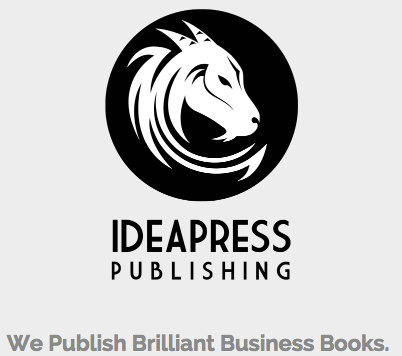An interview with Rohit Bhargava, author turned publisher
 Rohit Bhargava had an idea. After writing a few great books, he decided to become a publisher-partner for authors.
Rohit Bhargava had an idea. After writing a few great books, he decided to become a publisher-partner for authors.
Rohit’s Ideapress Publishing venture is closer to self-publishing, with some costs for authors, but with great upside and the benefits of partnership. His company has now published seven books, including his own bestseller Non-Obvious. Rohit’s got great insights on the publishing industry. Let’s read a few.
You’re an author. You had a pretty good gig as an author. Why branch out into publishing?
I had already done two books with large NY publishers with varying levels of success and became frustrated with the lack of professional support, subpar quality, cheap stock image based cover design and long delays. I decided to try and do it better for myself, but I didn’t want to cut corners either. At the same time, though, I realized there has been a huge talent drain in mainstream publishing and some of the best and most talented people are leaving to become freelancers.
The value of publishing has always been in people and distribution. The people side of their business is eroding and distribution in book stores can now be arranged directly (which we have done) without the necessity for a traditional publisher to act as a middle man. What I love about Ideapress, beyond the fact that we can provide a valuable service for authors, is that I’ve been able to employ amazing talented editors, designers, and production people who otherwise might struggle making the shift from a full time role to becoming a freelancer. If I can bring them interesting work and get authors a great result in the process, everyone wins.
What exactly is Ideapress, and how is it different from a normal publisher?
We exist to be an author-centric publisher, founded by a successful author. Every choice we make, from who to work with, to the support our authors get in every stage of the process is what I wished existed for me as an author. I hire some of the smartest minds in publishing with 30+ years of experience, and I personally get involved in every Ideapress title — from brainstorming ideas to helping direct cover design. We offer a level of personal attention and commitment that no one else in the industry does. And our aim is just to publish between 8-12 books a year. The model has been so successful already, we are almost full on projects for 2016. And to support authors further, I have recently started two imprints designed for authors with specific types of needs, including female business authors.
 Tell us about how you’ve turned watching trends into a business for yourself.
Tell us about how you’ve turned watching trends into a business for yourself.
I spend most of every year gathering and collecting ideas that may eventually be useful in producing my annual “Non-Obvious Trend Report.” I have been doing it for the past five years, and this past year I decided to finally expand it into a book. Every year from now on I will produce an update to that book, so now I have a recurring platform around trends.
The lesson in that, I think, for other authors is not to abandon your own ideas too quickly. There is a saying in marketing that right around the time when you’re starting to get sick of hearing your message over and over, it’s probably just starting to make an impact on your customer. When you are a creator, it’s tempting to move from one project to the next. What I am finding with Non-Obvious is that there is a value in working hard to make a platform into as much as it can be — and finding new ways to expand and grow it rather than shifting my focus to the next big thing too early.
How do you get Non-Obvious to be a bestseller without being in distribution channels (traditional bookstores)?
What a lot of authors don’t realize is that most best seller lists have specific lists for ebooks only – and our core strategy with Non-Obvious was to target hitting that list several weeks before the hardcover edition even came out. So the first decision was to separate the ebook from the hardcover in terms of their release dates. Then I launched a full combination of a PR program with a consultant to get the book on the radar of the right editorial staff at the lists, paid for highly targeted email lists to feature the book, and set the initial sales price at 99 cents on Amazon and B&N. Finally, I shared the book with my own audience I have worked for 10 years to build, asked them to support the book the first week it came out, and share it with all their friends. At its peak, the book was the #27 best selling book in the entire Kindle store on Amazon and hit #1 in every category we listed in, even the highly competitive overall business category.
What’s the number one piece of advice you give authors?
My number one piece of advice is something that I was asked early in my process when I was writing my first book — and it’s not about the concept of the book. You do need to have a great concept and idea — but an equally important question that authors often forget to think about is why you are the best person to write that book.
My second question I always ask is one that probably seems a bit sad to you (and to me as well). It is whether the author thinks of themselves as a writer or not. It’s amazing how many people start a book, but actually hate writing. I know you come from a place where writing is your passion, and I do as well. I was an English major in school and dreamed of writing screenplays and poetry (and did both!) before I became a marketer. I love writing, and so I write every word in my own books. If you’re not a great writer, you need to get help and be honest with yourself about that. I don’t have a problem with co-authors or even with ghostwriters. I have a problem with bad writing.
What’s the most hopeful thing you can say about the future of books?
I believe in books or else I wouldn’t have started Ideapress. I think a lot of the doomsday reports we hear about books in general are not about the “death of books” at all but about a shift in the publishing industry. People still consume books and see great value from them. Many people (including my 7 year old!) love to hold physical books in their hand. So I think the greatest sign of hope for books is that we can slowly get rid of the gatekeepers who add no value and create a world where ideas are easier to share. I think over time the best work will rise to the top and my ambition is for Ideapress to help make that happen.
Interesting. I did something very similar with http://www.motionpub.com. He’s right: The reason for writing the book is as if not more important than the subject itself.
What consideration would you have for senior citizen like me who have written on e novel already under title SPIRIT OF LOVE, available from Amazone?
I am in the process of writing my second novel titled PEACOCK’s Cry. Some chapters have been edited by a professional lady who initially trained me to become a writer.
When finished the story, how should I go about for submission to your company?
I wrote short stories In my school days in Bombay; writing stories is my main interest. I am a member of video and film club. I wrote and produced three short films of an average time of five minutes; they were well complimented in so called Triangular film club competing . I would appreciate your views. Thanks. Ramanlal Morarjee.
I’m afraid my advice is limited to writers of nonfiction.
I work in Retail and I’m also a Blogger so reading Rohit Bhargavas Non Obvious book not only identitified trends that are happening in Retail like Showrom Floors as a strategy to help Omnichannel Marketing but it identified a Blogging Technique called Microblogging that helped make what I do everyday more meaningful. The book did in fact help me to think different and I’m so grateful to have read it. This year I plan to read ten books and I know that a lot of what I learn will end up helping me to deliver more informative content on Abornewords.